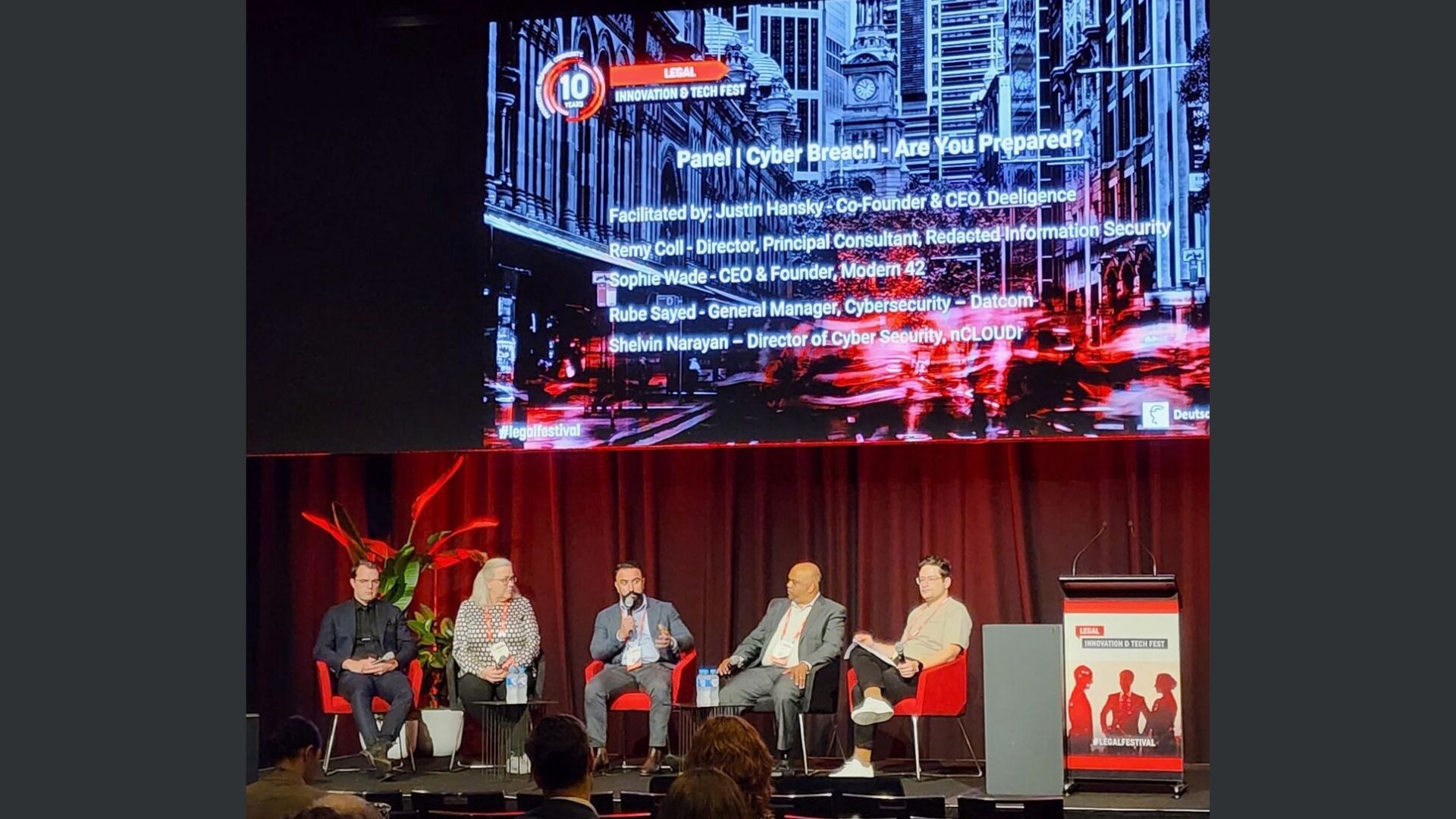Legal Innovation and Tech Fest 2025 lit up the Hilton Sydney with two days of energy, bold ideas, and revolutionary thinking. As the premier event for legal technology professionals, it gathered the brightest minds and biggest names under one roof to discuss how technology is reshaping the future of law.
Among the standout contributors was Zerto, a leader in disaster recovery and cyber resilience solutions. Following its 2021 acquisition, it now operates under the Hewlett-Packard Enterprise umbrella. Their presence reinforced the vital role technology continues to play in strengthening the legal sector’s defences.
Across packed auditoriums and buzzing networking spaces, industry experts, solution providers, and innovators showcased groundbreaking advancements redefining how law firms operate, safeguard client data, and deliver services.
The momentum at this year’s fest made it clear that the legal profession is not simply adapting to change but is charging ahead with it.

Highlight Moment: Cybersecurity Front and Centre
One of the most powerful moments of Legal Innovation and Tech Fest 2025 came during the “Cyber Breach – Are You Prepared?” panel discussion. This lively and thought-provoking session brought together some of the sharpest minds in cybersecurity.
Rube Sayed, representing Datcom Cloud, joined an expert lineup including Justin Hansky from Deeligence, Remy Coll of Redacted Information Security, Shelvin Narayan from nCLOUDr, and Sophie Wade from Modern 42.
Facing Cyber Threats Head-On
Together, they tackled some of the most urgent issues confronting legal teams today. The panel explored the real risks law firms must address, from the rising tide of sophisticated cyberattackstohidden vulnerabilitiesin third-party services. They highlighted the need for stronger frameworks, enhanced breach detection, and proactive defence strategies tailored specifically for the legal sector.
A Call for Action in the Legal World
Rube Sayed’s insights, grounded in hands-on experience, sparked meaningful conversations about the critical role legal departments must now play in cybersecurity. Using real-world examples and practical advice, the panel drove home a clear message: resilience must be built before an attack occurs. Their discussion brought a fresh sense of urgency to an industry where client trust and data protection have never been more crucial.
The Escalating Cyber Threat Landscape for Law Firms
Cyber threats have evolved into a daily reality for legal teams. As attacks grow more targeted and complex, protecting sensitive client information demands greater vigilance and strategic planning.
1. Ransomware and Phishing on the Rise
Legal organisations have become prime targets for ransomware groups and phishing campaigns. Attackers exploit vulnerabilities in outdated systems, poorly secured devices, and unsuspecting staff. The financial and reputational damage caused by these breaches can be devastating, pushing law firms to rethink their defences from the ground up.
2. Insider Risks and Third-Party Vulnerabilities
Internal threats are no longer rare occurrences. Disgruntled employees, human error, and accidental data leaks remain serious concerns. Adding to this complexity, third-party vendors often introduce security gaps that law firms struggle to control. Without comprehensive oversight, these connections leave client information exposed to greater risk.
3. The High Cost of Data Sensitivity
The legal industry handles volumes of highly sensitive material, from intellectual property to personal financial records. Criminals see legal databases as goldmines, targeting firms for immediate payouts and long-term exploitation.
Recent high-profile incidents have forced legal organisations to reassess how they store, manage, and protect their data against increasingly sophisticated attacks.
Proactive Defence: What Law Firms Must Do Now
Building stronger cybersecurity frameworks requires more than reacting to breaches. Legal teams must adopt clear, deliberate strategies that address evolving threats and defend sensitive client data at every level.
1. Implementing a Zero Trust Approach
A zero-trust model treats every user, device, and network interaction as untrusted until verified. Legal firms must consistently apply this principle to limit unauthorised access and protect critical systems from internal and external threats.
2. Advanced Threat Detection and Regular Updates
Law firms must invest in modern threat detection solutions to identify suspicious activity before damage occurs. It is essential to:
- Deploy intrusion detection and prevention systems across all networks
- Monitor unusual login patterns and file transfers in real time
- Maintain up-to-date antivirus and endpoint protection across every device
- Patch and update software regularly to close known security gaps
All sensitive data must be encrypted during storage and transmission. End-to-end encryption ensures information remains protected from unauthorised interception or breaches, even if networks are compromised.
4. Frequent Security Audits and Penetration Testing
Scheduled internal audits and external penetration tests reveal vulnerabilities before exploitation. These exercises:
- Identify system weaknesses and misconfigurations
- Validate the effectiveness of existing security measures
- Prepare legal teams to respond swiftly to real-world threats
5. Strengthening Vendor Management and Cyber Insurance
Vendors must undergo thorough security assessments before access is granted to internal systems. Law firms should also review cyber insurance policies carefully to ensure adequate protection against emerging risks.
Breach Preparedness and Why Planning is Non-Negotiable
A detailed plan before a cyber breach can mean the difference between fast recovery and lasting damage. Law firms must prepare systematically to face security incidents head-on.
1. Building a Comprehensive Incident Response Plan
A strong incident response plan is crucial. It must include:
- Defined roles and responsibilities for legal, IT, and communications teams
- Step-by-step procedures for containment, investigation, and recovery
- Clear internal reporting channels and escalation paths
- Templates for external communications to regulators and clients
Testing this plan regularly through tabletop exercises strengthens readiness and ensures that teams understand their roles under pressure.
2. Maintaining Updated Data Inventories and Secure Backups
Firms must know precisely what data they hold, where it is stored, and how it is protected. A current data inventory supports faster breach detection and more accurate reporting. Reliable backups, stored securely and tested often, help restore critical operations swiftly after an incident.
3. Engaging External Experts Early
Relationships with forensic investigators, cybersecurity consultants, and specialised legal counsel should be established well before they are needed. Early involvement reduces response time and improves the quality of decision-making during a breach, protecting client confidentiality and preserving legal privilege.
Critical First Hours: Managing Post-Breach Actions with Precision
The hours following a cyber breach are critical. Swift, coordinated action can contain damage, maintain client trust, and ensure compliance with legal obligations.
1. Preserving Evidence and Legal Privilege
During the initial response, firms must prioritise the preservation of digital evidence. Actions to take include:
- Securing compromised systems without altering forensic data
- Documenting all activities and decisions in real-time
- Involving legal counsel immediately to maintain privilege over sensitive communications
Maintaining control over evidence helps guide investigations and protects the firm’s legal position.
2. Ensuring Regulatory Compliance
Immediate steps must be taken to understand and meet breach notification requirements. This involves:
- Reviewing regulatory obligations under privacy laws and professional conduct rules
- Preparing accurate, timely notifications to affected parties and authorities
- Coordinating with communications teams to deliver consistent public messaging
Clear and compliant disclosures help to build trust and limit reputational damage.
3. Avoiding Common Mistakes
During the chaos of a breach, common errors can worsen the situation. Legal teams must avoid:
- Delayed involvement of legal advisors
- Premature notifications based on incomplete information
- Poor documentation of key actions and decisions
- Confusion around team roles and responsibilities
Future of Legal Cybersecurity: A Proactive, Integrated Approach
The future of cybersecurity in the legal sector demands more than isolated efforts. It calls for continuous improvement, deeper collaboration, and a mindset where protection becomes part of everyday operations.
1. Continuous Staff Education and IT Partnerships
Ongoing staff training is critical. Firms must deliver regular education programs to help employees recognise threats like phishing, social engineering, and insider risks. A strong partnership between legal and IT teams ensures security strategies align with professional obligations and client expectations.
2. The Expanding Role of Encryption and Vendor Oversight
Data encryption is now essential, securing information in storage and transit. Law firms must also apply stricter oversight when working with third-party vendors, ensuring partners meet rigorous security standards before access to systems or data is granted.
3. Innovation Driving Lasting Change
The solutions presented at Legal Innovation and Tech Fest 2025 demonstrated that cybersecurity is no longer an optional investment. Innovations showcased at the event revealed a sector steadily moving towards fully integrated defence strategies.
Legal practices must embrace this change, treating cybersecurity not as a project with an end date but as a core function woven into every part of their operations.

Empowering the Legal Industry Through Innovation and Resilience
Datcom proudly played a leading role in shaping the cybersecurity conversations at Legal Innovation and Tech Fest 2025, offering practical insights into protecting legal practices against evolving threats.
As the landscape grows more complex, the need for tailored, resilient cybersecurity solutions has never been clearer. Datcom’s expertise helps law firms stay one step ahead, safeguarding client confidentiality and strengthening operational integrity.
Now is the time to future-proof your legal practice. Contact Datcom today to discover how our specialised cybersecurity services can help you build a stronger, more secure foundation for lasting success in an increasingly connected world




